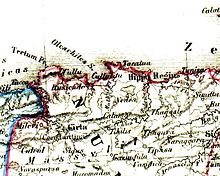Gilva was a Roman–Berber city in the province of Mauretania Caesariensis. It flourished during the Roman and Vandal empires.[1] It was located to the south of Hippo Regius in present-day Algeria. The town existed from around 300 to 640AD.

Gilva is known through the writing of Augustine, over a dispute over an appointment of a bishop to the bishopric seat who was unwanted by the parishioners.[2]
The town was a colonia and one of 170 bishoprics in Roman North Africa.[3] In 422, there was a local Church synod.[4]
Roman rule in the city ended in the 7th century with the spread of Islam.
See also
editReferences
edit- ^ Novum lexicon geographicum Illud primum in lucem edidit Philippus Ferrarius ...; nunc vero Michael Antonius Baudrand ... ,... dimidia... parte auctiorem fecit, ut Novum lexicon jure optimo dicatur. Accesserunt sub finem Dominici Magri (sumptibus J P.Shmidt, 1677 ) p 211.
- ^ Brent D. Shaw, Sacred Violence: African Christians and Sectarian Hatred in the Age of Augustine(Cambridge University Press, 2011) p.403.
- ^ William Smith, LLD. Dictionary of Greek and Roman Geography (1854).
- ^ Roger E. Reynolds, Studien zu den Quellen der frühmittelalterlichen Bussbücher by Ludger Körntgen, The Catholic Historical Review Vol. 84, No. 2 (Apr., 1998), pp. 318-322.